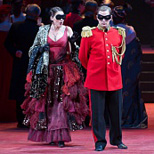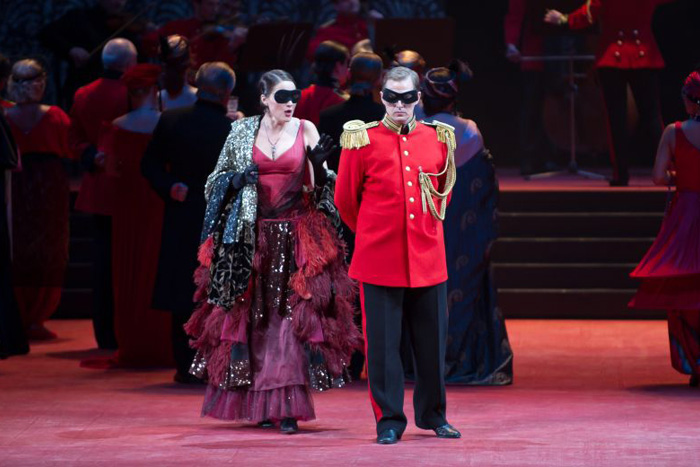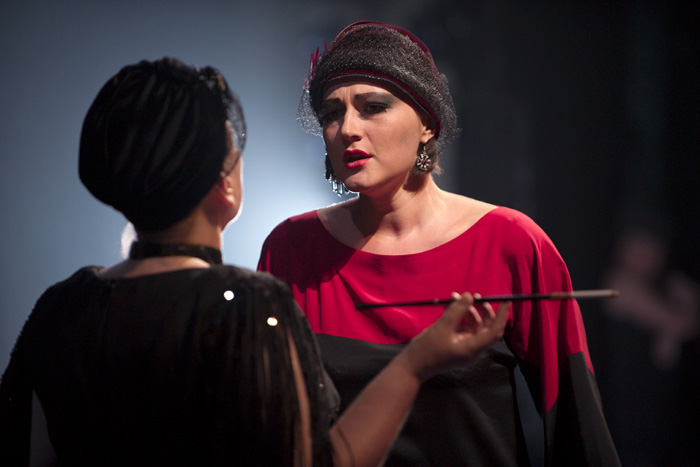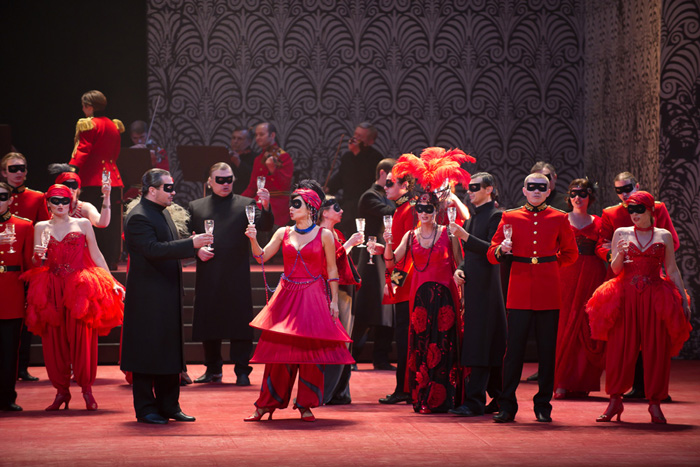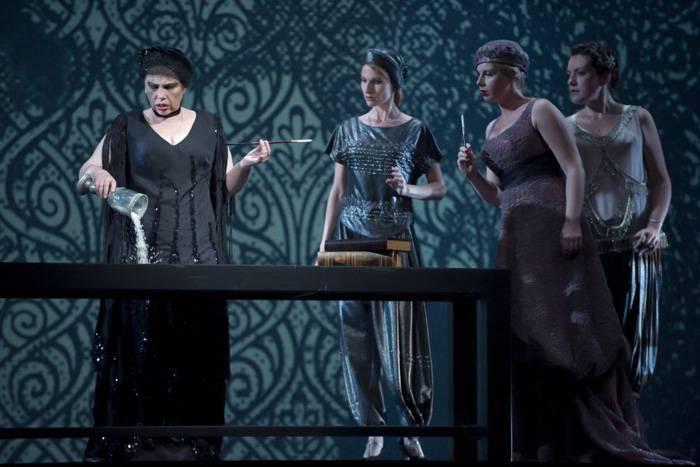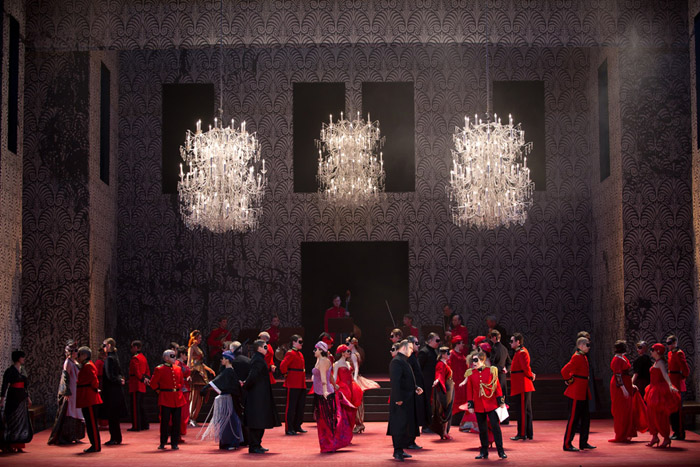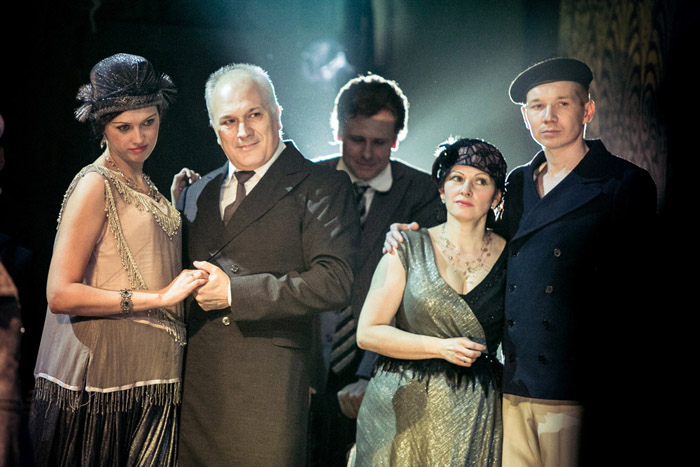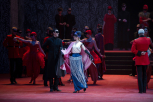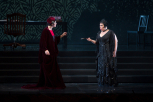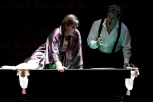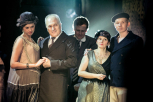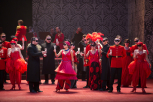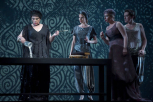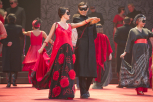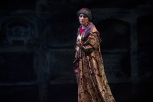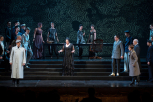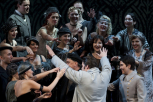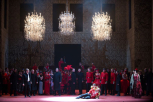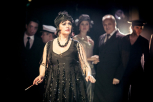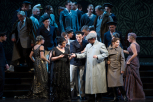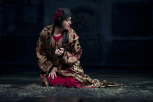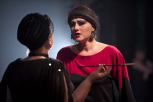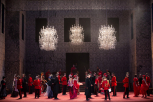Un ballo in maschera (Mikhailovsky Theatre, opera) - 19 April 2026 at 18:00
Genre: Opera | Language: Italian | Age restriction: 12+ | Length: 3 hours 20 minutes | Intermissions: 2 | Opening night: 21 July 2010
Credits
Libretto: Аntonio Somma, Francesco Maria PiaveMusical Director of the production: Peter Feranec
Stage Director: Andrejs Zagars
Stage Designer: Andris Freibergs
Costume Designer: Kristine Pasternaka
Production Engineer: Alla Marusina
Lighting Designer: Kevin W. Jones
Principal Chorus Master: Vladimir Stolpovskikh
Choreography: Elita Bukovska
Stage Director Assistant: Dace Wohlfahrte
Associate Stage Director: Yulia Prokhorova
Assistant Director: Vyacheslav Kalyuzhny
Chorus Masters: Sergey Tsyplyonkov, Alexey Dmitriyev
Assistant Conductor: Mikhail Leontyev
Rehearsal Conductor: Andrey Velikanov
Musical Style and Language Coach: Paolo di Napoli
Consultant in the Italian language: Daria Mitrofanova
Stage Designer Assistant: Elena Zykova
Principal Pianists: Natalya Dudik, Maria Mikirtumova
Surtitles: Margarita Kunitsyna-Tankevich
Stage Manager: Olga Kokh
Assistant Stage Manager: Daria Panteleyeva
Artists
Conductor — Mikhail TatarnikovPremiere of the production: July 21, 2010
The Mikhailovsky Theatre closed its 177th season with an opera premiere — a new production of Un ballo in maschera (A Masked Ball) by Giuseppe Verdi. The assassination of Gustav III of Sweden in 1792 became the basis of many plays and operas, among them an opera libretto by Eugène Scribe, set by Giuseppe Verdi in 1859 as Un ballo in maschera . In order to become the Un ballo in maschera which we know today, Verdi’s opera was forced to undergo a series of transformations, caused by a combination of censorship regulations, as well as the political situation in France in 1858. Verdi retained the names of some of the historical figures involved, the conspiracy, and the killing at the masked ball. The rest of the play — the characterizations, the romance, the fortune-telling — is an invention and the opera is not historically accurate.
Andrejs Zagars, a Latvian stage director, in cooperation with set designer Andris Freibergs and costume designer Kristine Pasternaka staged a new production of the opera at the Mikhailovsky Theatre. The public of St Petersburg saw a stylish and exciting piece which was a showcase for the best soloists of the Mikhailovsky Opera.
ACT I
Scene 1
A hall in the palace of King Gustav. The morning audience starts: Oscar the page hands the King a guest list for the upcoming masked ball. The name of Amelia on the list reminds him of his love for her. However, Gustav hides his love as she is married to his best friend and secretary, Renato.
As the courtiers disperse, Renato enters to warn Gustav of plots against his life led by two aristocrats, Tom and Samuel.
Credulous Gustav plays down the plot. He knows no fear.
Next to appear is a judge who produces petitions to be solved. He requests that Gustav exile Ulrica, a fortune-teller suspected of supernatural practices. The accuse makes the King curious and Gustav decides that he and his followers will disguise themselves and pay a personal call on Ulrica.
Scene 2
Ulrica’s dwelling. The fortune-teller is surrounded by a crowd of people. Disguised as a fisherman, Gustav hides in the shadow and listens to the story of Silvano, a sailor. He has served the King and has taken part in many sea battles. Now he asks Ulrica to divine his future. Ulrica predicts wealth and a commission, something that Gustav promptly brings to pass by secreting gold and the appropriate papers in Silvano’s bag. Silvano discovers his new-found wealth and all join in praise of Ulrica. The King enjoys Silvano’s happiness and people’s astonishment.
They are interrupted by a newcomer arrived who requests for his mistress an interview with Ulrica. Ulrica dismisses the crowd; but Gustav, who has recognized Amelia’s servant, remains in his hiding place as Amelia comes in.
Amelia asks Ulrica to rid her of the forbidden love that torments her. The King is happy to hear that Amelia’s secret love is himself. Ulrica agrees to help the woman in love and tells her of a herb that grows in the gallows-field and must be picked by Amelia at night. Amelia prays that she may be healed and Gustav, still hidden, vows to follow her on her quest.
As Amelia departs, Ulrica’s dwelling is filled with Gustav’s entourage. Gustav is the first to ask for his fortune but Ulrica refuses to tell. When Ulrica warns of imminent death at the hands of the man who first shakes his hand, Gustav laughs it off. He offers his friends to shake hands but everybody refuses: even Tom and Samuel are afraid that they will be suspected before they’re ready for the plot.
The prophecy is seemingly made absurd by the faithful Renato who hurries on soon after and immediately clasps his master’s hand.
A crowd led by Silvano returns to Ulrica’s dwelling: he has told everybody of his luck and now is looking for the benefactor. The people honor the King.
ACT II
Scene 3
At night Amelia arrives at the gallows to pluck the herb. Gustav who has secretly followed her appears and confesses her love. Renato arrives to warn the King that conspirators are closing in. Amelia veils herself at her husband’s approach. Renato and Gustav exchange cloaks to mislead the conspirators. Renato persuades the King to escape immediately but firsthand Gustav asks Renato to escort the veiled lady back to the city. But they are waylaid by the conspirators who find out that they have caught the secretary instead of the King. They decide to amuse themselves by seeing the face of the mysterious woman. When it becomes clear that Renato, in his loyalty to the Count, will fight rather than permit this, Amelia accidentally drops her veil.
The conspirators cannot contain their mirth at the notion of Renato’s nocturnal assignation with his own wife. Renato is astounded: he shouldn’t have trusted either his wife or is best friend. In a fit of jealousy, asks the conspirators to his house the next day.
Left alone with Amelia he orders her to go home with him: he’s sworn to see her to the city and will keep his word.
ACT III
Scene 4
Renato’s house. Finding Renato determined to kill her, Amelia begs to be allowed to bid their son farewell. Left alone, Renato reflects that he should rather kill Gustav. As day breaks, Samuel and Tom arrive. He demands to join in their conspiracy and to kill himself the King. The conspirators don’t agree and they elect to draw lots to decide who will strike the fatal blow. , and Renato takes advantage of Amelia’s return to force her to draw the lot. Amelia doesn’t know what she’s involved in but is filled with foreboding. She has drawn the lot with Renato’s name.
Oscar the page brings an invitation to the masked ball and the conspirators decide that the king is going to be assassinated that night.
Scene 5
Gustav is alone. He has decided to abdicate from Amelia as he can’t betray his best friend. That’s why he has just signed a paper sending Renato and Amelia to another city. He’ll never see his beloved Amelia. Oscar brings an unsigned letter of the plot. The letter was written by Amelia but Gustav but he pays no attention to it. In the ballroom the celebration has started. Renato finds out what costume the King is wearing. Amelia recognizes Gustav too. She begs him to leave the ball. He confesses his love again and says that they should never see each other again. Renato shoots the King and tries to escape. The courtiers catch the murderer and take off his mask. Dying Gustav passes Renato the paper showing he intended to send them both away and swears nothing has ever happened between him and Amelia. He forgives Renato and forbids revenge. His last words call for peace between those in discord.
video
Mikhailovsky (ex. Mussorgsky) Theatre playbill
book tickets now!
Price: 138.05 - 276.11 USD
book now- There are 29 people looking at this show
